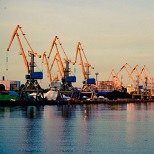Set on the right path
Foreign direct investment (FDI) in Ukraine slumped to $2.2bn in 2017, falling from the $10.7bn peak of 2008. The post-Euromaidan deterioration of the investment climate, political instability and the significant devaluation of the local currency are only partly to blame. A focus on a commodity-based economy is not particularly attractive to foreign investors and corruption in courts and law enforcement agencies are not incentivising businesses to take risks.
Despite the Ukrainian leadership’s appeals to invest in the country, Ukraine remains a difficult place to do business. Investors still face issues such as regulatory risk relating to land ownership and capital flows, problems with registration and ownership of property, complicated tax administering, lack of trust in the judiciary, oppressive enforcement agencies and unlawful actions by the Prosecutor General’s Office, the SBU (Security Service of Ukraine) and police. Corruption continues to hold back Ukraine’s rapid economic recovery and impede its healthy development.
FDI, without doubt, is the key to Ukraine’s sustainable and healthy economic development and should be the basis for decisive economic growth. The attraction of FDI should be one of the highest priorities for the Government and its agencies. But if perceived corruption continues, then all attraction efforts will be in vain.
During the last few years, Ukraine’s leadership has established a few important institutions, such as the police, the Supreme Court, and new anti-corruption agencies, but the reform process has been mixed. In a European Business Association survey, 57% of those surveyed were ‘dissatisfied’ with the investment climate in 2017; that number has now decreased by 20%, but 38% of investors are still unhappy with the business climate. The biggest reason given for dissatisfaction was the high level of corruption, second only to a lack of trust in the judicial system and the lack of land reform.
Port problems
According to the Ukrainian State Property Fund, 70% of Ukraine’s port infrastructure is outdated. The dire need for modernisation in ports coupled with the growing demand for port grain handling facilities to cope with increasing exports have turned considerable attention to infrastructure projects. The Government’s ministry of infrastructure, with the support of international finance institutions, has launched several infrastructure projects including dredging works in Chornomorsk and Yuzhny ports, concession projects in Kherson and Olvia ports, and realisation of the Via Carpatia and Gо Highway.
Even with this challenging business climate, Ukraine’s ports sector is attracting investment and will continue to do so as long as the authorities in charge implement and maintain critical changes, such as introducing support teams to government ministries. These teams — such as Spilno Office, Reform Support Team of the Ministry of Infrastructure, and the National Investment Council — are not only critical for the delivery of the much-needed reform priorities, but they are also the talent that will spearhead a business climate change.
The Ukrainian government has also taken a number of practical actions on a legislative level. A new draft law on concessions and a legal framework for inland waterways is in Parliament and expected to be voted on and approved this year.
Already, there are encouraging signs in the Ukrainian port sector: P&O Maritime started operations in Ukraine in January and other world-leading port operators such as DP World and Hutchison Ports are eyeing port assets in Yuzhny and Chornomorsk.
Local, private port operators are not lagging behind either. Private port operator TIS is launching a modern grain terminal jointly with the global trader Cargill, while another grain terminal is under construction in the port of Mariupol.
Сonclusion
Ukraine is thus emerging as a hidden gem for international investors targeting high returns in a strategically important location next to major European markets. While the risk posed by corruption and complex legislation should not be underestimated, these challenges can be overcome.
Government support complemented by a favourable attitude from funding institutions is invaluable, but this must be paired with comprehensive and dedicated guidance from international and local business consultants to unlock the value and prise the pearl from the shell on the Black Sea coast.
Portstrategy.com

MIU Preparing Concession in 7 Ports Ministry of Infrastructure of Ukraine (MIU) welcomes the private initiative as concerns launching...

MIU Talking with Odessa Passenger Sea Terminal Concession Initiator Minister of Infrastructure of Ukraine Vladyslav&...
 October Transport, Shipping & Port News2020.11.04
October Transport, Shipping & Port News2020.11.04Dear Reader! From now on this Bulletin is not confined to ports and terminals, but dedicated to shipping and transport of Ukraine a...

It may be convenient and profitable to cooperate with a state-owned enterprise. Task The Client, large South Africa...
 PROHIBITED Import/Export2018.09.06
PROHIBITED Import/Export2018.09.06In this article, we will speak about the most recent ones, and try to give an answer to the question how legal their affairs at the Ukrainia...
 Set on the right path2018.08.31
Set on the right path2018.08.31Foreign direct investment (FDI) in Ukraine slumped to $2.2bn in 2017, falling from the $10.7bn peak of 2008. The post-Eu...



 Odessa, 65014, Ukraine, 1 а, Gretska St
Odessa, 65014, Ukraine, 1 а, Gretska St
